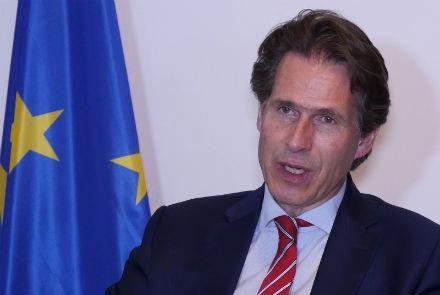The European Union expects on time and fair presidential elections in Afghanistan and that it will fully support the process, an EU official said at a ceremony in Kabul on Tuesday.
“The European Union's position is clear that we expect elections to be held within the established timeframe on 28 September 2019. And we are fully supportive of the free and fair electoral process,” said Gunnar Wiegand, Managing Director for Asia and the Pacific at EU’s External Action Service, who addressed the Second Afghanistan-EU Joint Committee under the EU-Afghanistan Cooperation Agreement for Partnership and Development (CAPD).
Wiegand said a legitimate leadership should be formed to lead the peace talks with the Taliban.
He said the Afghan people should own the process and such ownership will be a reflection of a democratic system in Afghanistan.
Wiegand said the EU will continue its support to Afghanistan even after a possible peace deal between the Afghan government and the Taliban.
“It is also clear that we have a need felt by everybody to get prepared for the Afghan-led and Afghan-owned peace process that we have argued for so many years. So, the intra-Afghan talks are very important to show that democratic Afghanistan, the Islamic Republic of Afghanistan, independent of all the competition which is natural in any democracy as numbers of key principles which would be brought into this intra-Afghan talks,” said Wiegand.
This comes as both processes, despite having made good signs of progress, are facing a number of challenges.
On the side of elections, 12 election teams want President Ashraf Ghani to leave power after the end of the National Unity Government’s tenure on May 22. But the Presidential Palace has said the president will remain in power as the Supreme Court has extended his tenure.
Although the Independent Election Commission has shown preparedness for holding the elections on September 28, electoral monitoring organizations said that it will be challenging for the commission to manage the elections in such a short period as it spent a long time on parliamentary elections' problems inherited from the former leadership of the two election commissions.
Meanwhile, the sixth round of peace talks between the US and the Taliban in Doha has ended, but so far, no considerable achievement has been gained except a drafted agreement on a number of key issues in the fifth round of the negotiations which ended in mid-march.

